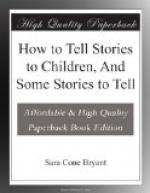It does not so greatly trouble the teacher who uses the nature story as a story, rather than as a text-book, for she will not be so keenly attracted toward the books prepared with a didactic purpose. She will find a good gift for the child in nature stories which are stories, over and above any stimulus to his curiosity about fact. That good gift is a certain possession of all good fiction.
One of the best things good fiction does for any of us is to broaden our comprehension of other lots than our own. The average man or woman has little opportunity actually to live more than one kind of life. The chances of birth, occupation, family ties, determine for most of us a line of experience not very inclusive and but little varied; and this is a natural barrier to our complete understanding of others, whose life-line is set at a different angle. It is not possible wholly to sympathise with emotions engendered by experience which one has never had. Yet we all long to be broad in sympathy and inclusive in appreciation; we long, greatly, to know the experience of others. This yearning is probably one of the good but misconceived appetites so injudiciously fed by the gossip of the daily press. There is a hope, in the reader, of getting for the moment into the lives of people who move in wholly different sets of circumstances. But the relation of dry facts in newspapers, however tinged with journalistic colour, helps very little to enter such other life. The entrance has to be by the door of the imagination, and the journalist is rarely able to open it for us. But there is a genius who can open it. The author who can write fiction of the right sort can do it; his is the gift of seeing inner realities, and of showing them to those who cannot see them for themselves. Sharing the imaginative vision of the story-writer, we can truly follow out many other roads of life than our own. The girl on a lone country farm is made to understand how a girl in a city sweating-den feels and lives; the London exquisite realises the life of a Californian ranchman; royalty and tenement dwellers become acquainted, through the power of the imagination working on experience shown in the light of a human basis common to both. Fiction supplies an element of culture,—that of the sympathies, which is invaluable. And the beginnings of this culture, this widening and clearing of the avenues of human sympathy, are especially easily made with children in the nature story.
When you begin, “There was once a little furry rabbit,"[1] the child’s curiosity is awakened by the very fact that the rabbit is not a child, but something of a different species altogether. “Now for something new and adventuresome,” says his expectation, “we are starting off into a foreign world.” He listens wide-eyed, while you say, “and he lived in a warm, cosy nest, down under the long grass with his mother”—how delightful, to live in a place like that; so different from little boys’ homes!—“his




